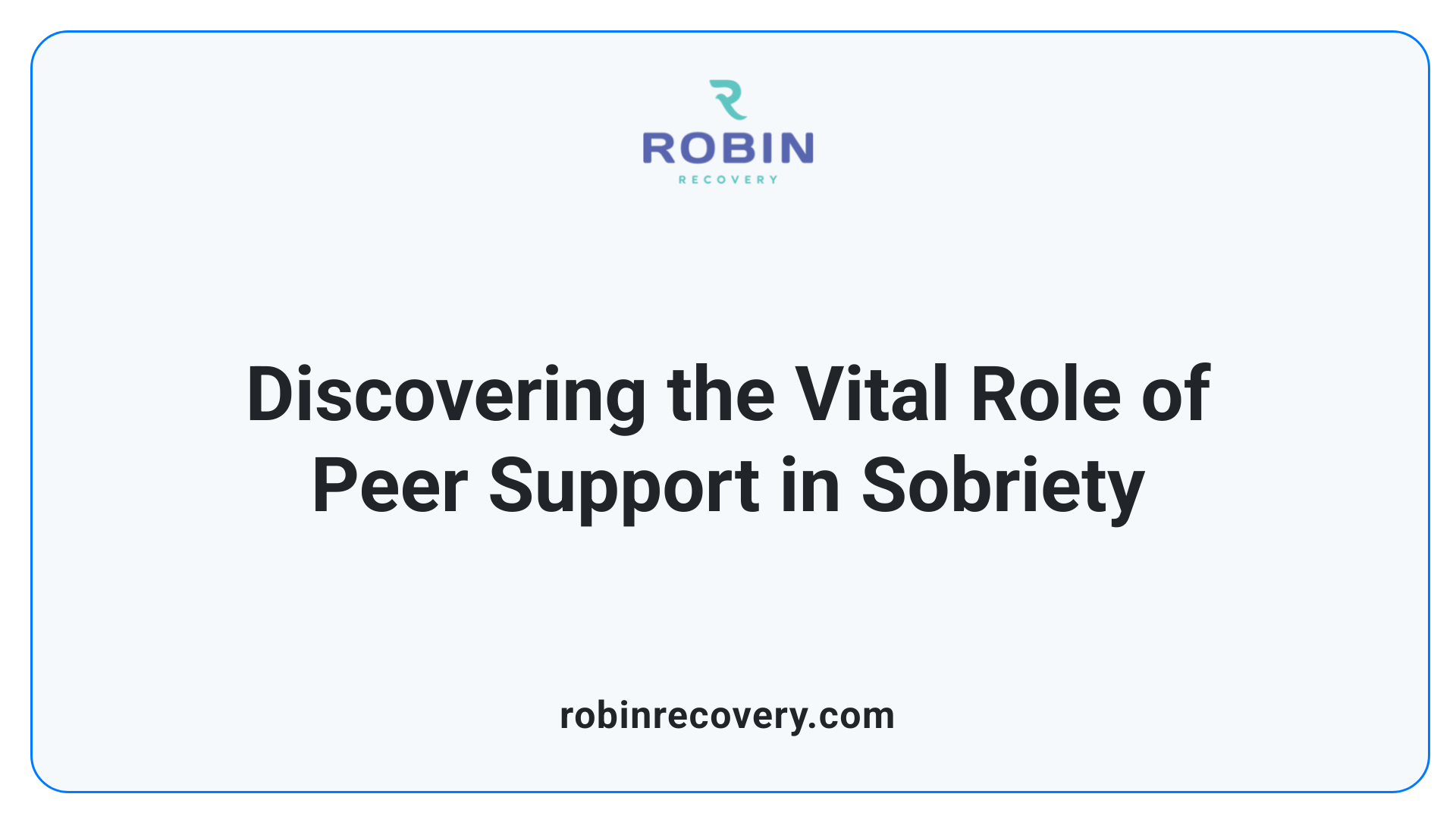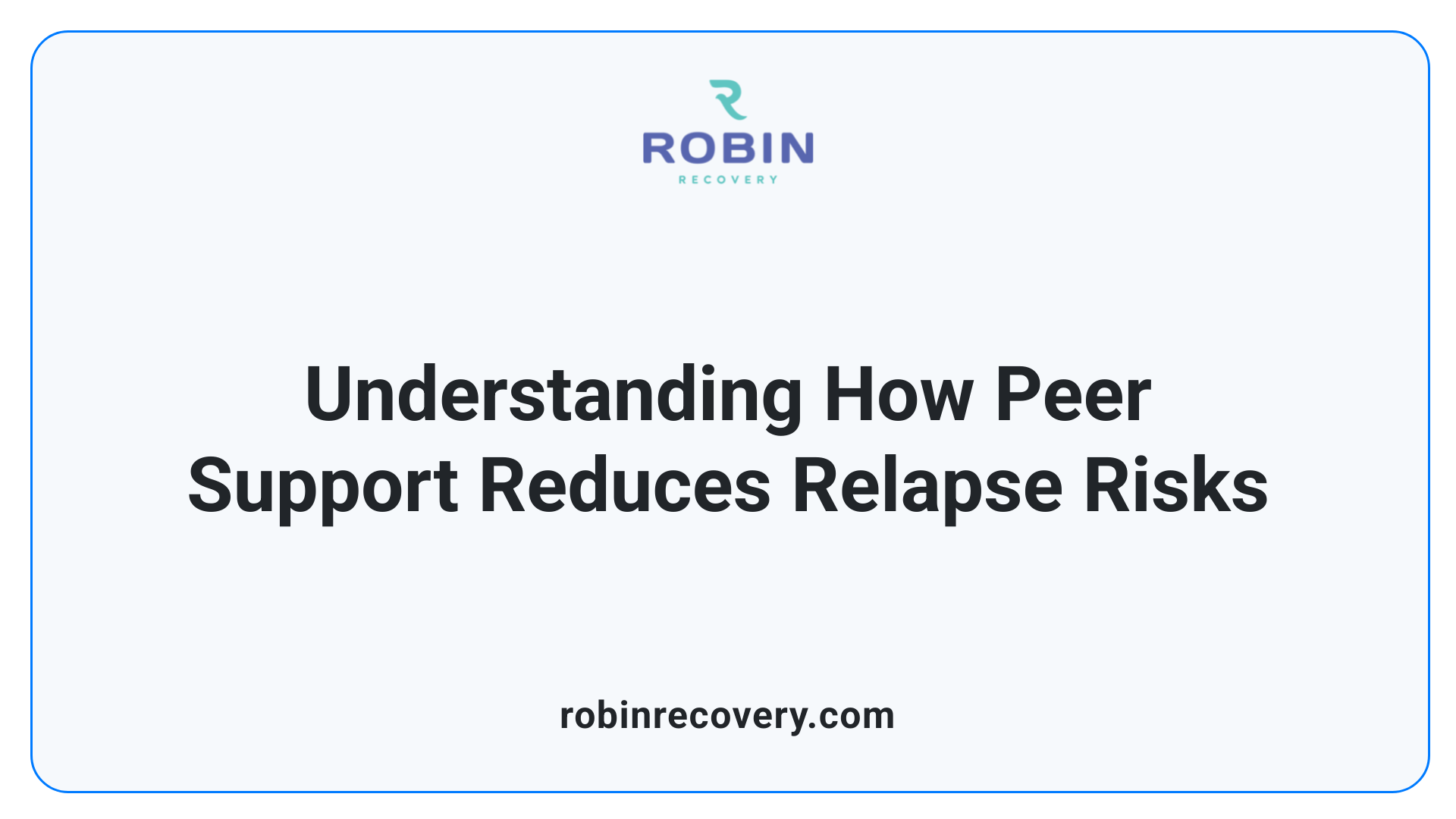The Impact of Peer Support Groups on Long-Term Sobriety

Discovering the Power of Peer Support
Peer support groups have emerged as a cornerstone in addiction recovery, offering a unique blend of emotional support, social connection, and shared experiences. These groups not only act as a lifeline to maintain long-term sobriety but also significantly enhance recovery outcomes. Through the stories and insights of those who have walked similar paths, peer support groups provide a powerful, evidence-based mechanism that complements traditional treatment approaches. This narrative explores the transformative role of peer support in fostering sustained recovery among individuals with substance use disorders.
The Essential Role of Peer Support Groups in Sobriety

What role do peer support groups play in maintaining long-term sobriety?
Peer support groups play a vital role in maintaining long-term sobriety by creating a community where individuals can share their experiences and offer mutual encouragement. The supportive atmosphere these groups provide helps create strong accountability, motivating each member to stay committed to their recovery goals. This sense of belonging not only enhances individual resolve but also strengthens social ties, which are crucial for enduring sobriety.
Research indicates a significant reduction in relapse rates among participants. Individuals engaged in peer support are less likely to relapse than those relying solely on clinical support, with peer involvement reportedly lowering relapse rates by about 35%. Notably, programs like Alcoholics Anonymous have long demonstrated their effectiveness in sustaining recovery over time.
The mental health benefits accompanying peer support are profound. Participants often report improved emotional well-being, including reduced symptoms of anxiety and depression. This is largely due to the safe environment where individuals can express feelings of fear and uncertainty without judgment. The shared experiences within these groups foster resilience and enhance coping strategies, which are critical for navigating the challenges of recovery.
Mental Health Gains Through Peer Networking

What is the connection between peer support and mental health in sobriety?
The connection between peer support and mental health in sobriety is profound, as peer support provides emotional and social support essential for individuals in recovery. Peer support groups, such as Alcoholics Anonymous and Narcotics Anonymous, foster a sense of community and belonging through shared experiences, significantly reducing feelings of isolation.
These groups not only improve self-efficacy and coping skills but also encourage accountability, which helps individuals stay committed to their recovery goals. In fact, studies demonstrate that participation in peer support leads to a remarkable 62% reduction in mental health symptoms over one year, addressing both co-occurring mental health challenges and substance use disorders.
Moreover, peer supporters benefit from the experience as well, often gaining confidence and purpose, which further enhances their own recovery journey. When individuals in peer programs receive support, they report greater satisfaction with treatment, marked decreases in depression and anxiety, and an overall boost in their mental well-being. This reciprocal relationship suggests that peer support acts as a powerful mechanism for both personal growth and communal healing in the recovery process.
Emotional and social benefits in recovery
Peer support gives members a safe space to discuss their struggles and successes, fostering respect and understanding among participants. Regular meetings enhances accountability, pushing individuals to engage actively with their recovery efforts. These social connections are crucial, as they instill feelings of acceptance and belonging, which greatly influence long-term sobriety.
The emotional support offered by these groups is invaluable. It helps to dissipate feelings of fear and uncertainty while reinforcing healthier emotional responses. Participants often find that sharing their experiences boosts their self-esteem and alleviates feelings of guilt and shame, making room for healthier thinking patterns. The support network provided through peer groups serves as a protective factor against relapse, promoting continuous personal growth and a more robust commitment to sobriety.
Transformative Benefits for Individuals in Recovery

How do peer support groups benefit individuals in recovery from substance use disorders?
Peer support groups offer a vital lifeline for individuals navigating the tough terrain of addiction recovery. By creating a community that fosters belonging, these groups significantly reduce feelings of isolation often experienced by those battling substance use disorders.
Participants report increased motivation and accountability through shared goals. Being part of a supportive network enhances treatment retention and lowers the risk of relapse. In fact, studies show that individuals involved in peer support initiatives have a 35% lower relapse rate compared to those without such support.
Having mentors who have successfully maintained sobriety serves as a beacon of hope. These seasoned members provide practical guidance drawn from real-life experiences, which resonates deeply with newcomers. This relatable advice, often more impactful than professional counsel, reinforces trust within the group.
Emotional support is another cornerstone of peer support. Sharing successes and failures in a safe space cultivates resilience, making it easier for members to cope with cravings and challenges. Alongside shared experiences, practical strategies are exchanged, giving participants the tools they need to confront obstacles in their recovery journeys.
Overall, peer support plays a crucial role in enhancing individuals' psychosocial well-being. It leads to not just sustained recovery but also encourages positive lifestyle changes that promote a healthier and more fulfilling life.
Reducing Relapse and Enhancing Recovery Experience

In what ways does peer support reduce relapse risks and promote positive recovery experiences?
Peer support plays a crucial role in reducing relapse risks and enhancing positive recovery experiences. It creates an environment where individuals feel a strong sense of community, accountability, and understanding among peers who share similar challenges. Research indicates that those involved in peer support initiatives experience a notable improvement in various aspects of their recovery journey.
- Enhanced Treatment Retention: Engagement with peer support programs has been shown to increase treatment retention rates by 20%. Individuals are more likely to stick with their recovery plans when they feel supported by peers who understand their struggles.
- Lower Relapse Rates: Studies have demonstrated that participation in peer support groups can decrease relapse rates by as much as 35%. This significant reduction highlights the effectiveness of peer support in helping individuals maintain long-term sobriety.
- Improved Mental Health: Participants in these groups often report a 62% reduction in mental health symptoms, addressing issues such as anxiety and depression that commonly accompany substance use disorders. By sharing their challenges, members find empathy and validation, which diminishes feelings of isolation.
- Shared Experiences and Relatable Advice: Active engagement with peer supporters who have experienced similar issues provides recovering individuals with practical insights and hope. This rapport fosters trust in the recovery process, making it easier to adhere to treatment and recovery plans.
- Accountability and Motivation: Regular meetings in peer support settings instill a sense of mutual responsibility, motivating individuals to commit not only to their recovery but also to the support of their peers. This environment enhances their progress and encourages healthier coping strategies.
By integrating these aspects, peer support not only directly correlates with reduced relapse rates but also cultivates a healthier emotional landscape for individuals in recovery, thus establishing a solid foundation for sustained recovery outcomes.
Evidence Supporting Peer Support Effectiveness

What evidence-based findings exist regarding the impact of peer support on recovery outcomes?
Research shows that peer support systems significantly enhance recovery outcomes. A variety of studies highlight the positive impact of these groups on individuals in recovery from substance use disorders. For instance, peer support can double the chances of staying sober compared to going through recovery alone.
Statistical Impact on Recovery Outcomes
Here are a few key insights:
AspectImpactDetails Increased Sobriety 35% lower relapse risk Individuals involved in peer support programs have a 35% lower chance of relapse than those who are not. Treatment Retention 20% improvement Combining peer support with clinical care boosts treatment retention rates by 20%. Mental Health 62% reduction in symptoms Participants in peer programs report a 62% reduction in mental health symptoms over one year. Substance Use 30% greater reduction Engaging in peer support leads to a 30% greater reduction in substance use compared to those not participating.
The findings indicate that supportive peer relationships are vital, reducing barriers such as stigma and enhancing continuous engagement in treatment. Ultimately, integrating peer support creates a comprehensive approach, boosting abstinence rates and improving overall mental well-being.
Integration of Peer Support with Professional Treatment
How do peer support groups integrate with professional treatment for addiction recovery?
Peer support groups play a pivotal role in addiction recovery by integrating seamlessly with professional treatment. These groups elevate client engagement and retention significantly. For instance, peer support enhances treatment satisfaction as it brings unique insights from peer workers who share lived experiences, making the support feel personalized and relatable.
Moreover, peer support services provide emotional, informational, and instrumental support that complements traditional clinical approaches. This holistic support boosts motivation and adherence to treatment plans, allowing individuals to feel connected and understood by others who have walked similar paths.
Successful integration requires strong leadership commitment and extensive training for both peer and non-peer staff. Creating an environment that values the contributions of peer specialists is essential. Additionally, overcoming challenges such as stigma and initial resistance from professionals is critical to fostering collaboration between peers and clinicians.
When effectively combined with professional treatment, peer support enhances overall recovery outcomes, allowing individuals to navigate their recovery journeys more successfully, building a stronger foundation for sustainable sobriety.
The Sustaining Strength of Peer Support in Recovery
The unwavering support and shared experiences found within peer groups prove to be an invaluable asset in managing addiction recovery. From reducing risks of relapse to enhancing mental well-being, peer support groups extend a lifeline of practical and emotional assistance that integrates seamlessly with professional treatment approaches. As individuals navigate their paths to sobriety, these groups furnish both hope and camaraderie, forging connections that fortify the recovery process. Embracing peer support demonstrates a commitment not only to oneself but also to community, unveiling a transformative journey towards sustained sobriety.
References
- How Peer Support Strengthens Long-Term Sobriety - IKON Recovery
- The Vital Role of Peer Support Groups in Recovery
- Importance of Peer Support Groups After Rehab - Baton Rouge ...
- The Importance of Social Support in Recovery Populations
- What is the Evidence for Peer Recovery Support Services?
- The Role of Peer Support Groups in Recovery - Harris House
- The Role of Peer Support Groups in Recovery - Gateway Rehab
- The Importance of a Peer Support Group During Recovery
